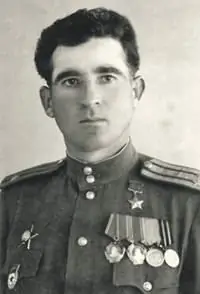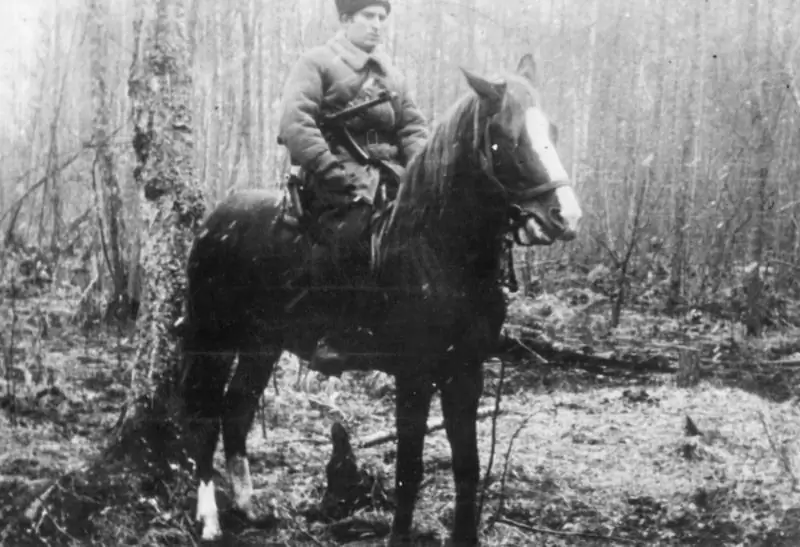- Author Matthew Elmers elmers@military-review.com.
- Public 2023-12-16 21:49.
- Last modified 2025-01-24 09:17.

June 10 would have marked the 110th anniversary of the Hero of the Soviet Union, Colonel Anton Petrovich Brinsky (1906-1981), commander of the intelligence and sabotage Operational Center of the Intelligence Directorate of the General Staff of the Red Army "Brook". Eleven temporarily occupied regions of Belarus and Ukraine, three Polish voivodships were in his focus. 5000 sabotage operations, more than 800 exploded trains not only inflicted significant damage on the enemy, but also reliably masked the main combat work of the Operations Center - reconnaissance. The systematic intelligence information of this almost 3,000-strong formation had a serious impact on the preparation and conduct of a number of strategic offensive operations of the Red Army …
FROM COMMISSORS TO GUARANTEES
The commissar of the 59th separate reconnaissance battalion A. P. It was not easy for Brinsky: they were not taught this, they could be accused of wanting to wait out the war, to repress their relatives, and the overwhelming majority of the "encircled people" strove to join up with regular units. However, having reached with battles from the Prussian border to the outskirts of Minsk, he decided no longer to strive for the front line that was slipping further and further to the east, but to beat the enemy here, in his own rear. In the fall of the 41st, he merged with the special detachment of the 2nd rank military engineer G. M. Linkova. The first six months of the partisan struggle were the most difficult - and the experience is still small, and the enemy is strong. But by the spring, in a number of settlements of the Vitebsk, Vileika, Minsk regions, they organized groups of the people's militia, eight partisan detachments, set up sabotage and other combat work. The main replenishment of the detachments were soldiers who escaped from captivity or healed their wounds in remote villages.
In May 1942, leaving strong partisan formations in the developed areas, G. M. Linkov with A. P. Brinsky, two small detachments make a 600-kilometer raid to the south-west in a month, to a more developed network of railways. During the raid, 56 acts of sabotage were committed with the collapse of enemy military echelons. In the Pinsk region by the lake Chervone G. M. Linkov organized his Central Base, and A. P. Brinsky on Lake Vygonovskoye - a school of demolitions and six new detachments. The short theoretical course was backed up by extensive practice. The saboteurs A. P. Brinsky went on the offensive on the railway lines connecting the cities of Brest, Baranovichi, Lida, Volkovysk. Only from August 10 to September 10, they derailed 68 enemy echelons and an armored train.

BRIGADE "UNCLE PETI"
In November, having selected 37 people, A. P. Brinsky makes a raid even further to the south-west in order to "serve" with sabotage the large railway junctions of Kovel and Sarny. Here, under the pseudonym "Uncle Petya" for the New Year 1943, he created a brigade of 14 detachments on the basis of local partisan groups, and deployed a wide network of agents.
After the victory at Stalingrad, the influx of the local population into the partisan detachments increased sharply. A second brigade is organized, several raid detachments are organized to carry out special tasks of the General Staff (taking the language, weapons, military equipment, etc.). The most effective such detachment was commanded by the never discouraged Arzamas citizen Pyotr Mikhailovich Loginov: only the number of the destroyed echelons exceeds one and a half hundred. But the implementation of the presentation for the title of Hero of the Soviet Union, apparently, was prevented by a short (while the wounds healed) stay in captivity …
“Uncle Petya,” as Anton Petrovich was called in Ukraine, issued an order for the creation of several family (“civilian”) camps, where hundreds of families from ghettos and burned-down villages were saved from extermination. At these camps, he set up the production of mines from unexploded bombs, shells and mines; in total, more than 17.5 tons of explosives were melted. For comparison - Moscow was able to deliver 1, 6 tons, though in the form of more convenient for use than homemade mines of slow and instant action, termite balls, etc. By the spring of 1943, about 300 enemy echelons with personnel, military equipment, weapons, equipment, food, etc. were derailed.
At the same time, there was continuous work to paralyze the local occupation authorities, destroy local industrial and agricultural enterprises that worked for the occupiers, and decompose collaborationist formations. Western Ukraine is a complex interweaving of the Ukrainian, Belarusian, Polish and Jewish population, subject to the strong influence of their ecclesiastical (Orthodox, Uniate, Catholic, Jewish) hierarchs.
The occupiers skillfully inflamed nationalist feelings, in which (unlike national) it is not so much love for their nation that prevails as hatred for others. Along with the war that was going on on the Soviet-German front, in the rear of the invaders there was an internecine war, which they supported in every possible way. In Western Ukraine, it was very acute, and "Uncle Petya" tried to minimize its metastases. This is probably why there is a monument erected to him at the initiative of the local population in the regional center of the Volyn region Manevichi. After all, many of them survived thanks to the "Uncle Petit" partisans.
AFTER THE WAR
Since August 1945, he lived and served in the city of Gorky, where, shortly before his transfer to the reserve in 1955, the first book by A. P. Brinsky "On the other side of the front".
He held about two dozen public (that is, unpaid) positions, including in the city council, in the Soviet district party committee. But his main business was his duty to the fallen and living heroes of the partisan second front. And in his ten documentary books (the tenth collection on intelligence officers remained unpublished) he captured more than half a thousand of their names.
He considered his main award not the Hero's Golden Star, not three Orders of Lenin and other orders and medals, but life. And he tried to dispose of it in such a way as to leave the memory of people with a clear conscience - partisans.
Moreover, neither during the war years, nor after its end, adequate attention was paid to those who fought behind enemy lines. And it was not easy to figure out who in the occupied territory acted on the instructions of their own, and who - for other reasons. Often they understood very straightforwardly … The truth was more than once helped to establish the books of Anton Petrovich …
He often appeared in local media, and even more often in labor, military, school and student teams. For everyone, he was not a scout, but a partisan commander and the author of books about partisans.
Now they are a rarity in libraries and because decades have passed since their publication, and songs are different now in fashion. But patriotism is always relevant, and spiritually our people have always been strong. Our roots in life are in the heritage of the past, in its military glory. They feed the children and grandchildren of the heroes of that now distant war who are fighting today.
"Saboteur No. 1" Colonel Ilya Grigorievich Starinov, mentioning in one of his last publications "the brigade of the most distinguished Hero of the Soviet Union Anton Brinsky", called him "a Gorky citizen." This mistake in the place of birth, reflecting the real scarcity of official, but not always accurate information about the Hero, is unmistakable in the main thing: the combat results speak volumes about the place of A. P. Brinsky in the first row of saboteurs of the Great Patriotic War. It was in our city that he created his once famous chronicles of the partisan struggle. They will still be in demand …






